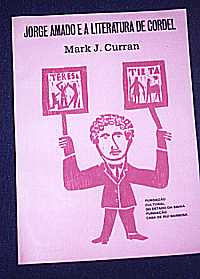









| |
JORGE
AMADO E A LITERATURA DE CORDEL.
Salvador:FundaçãoCasa de Jorge Amado --
Fundação Casade Rui Barbosa, 1981, 95 pp. 
This monograph was published on the occasion of the celebration of fifty years
of literature of Jorge Amado in Bahia in 1981.
Because it was part of the Amado celebration covered by television,
national news magazines and Vargas Llosa for Peruvian television, Amado appeared
at the book signing and Isto É included an article on Curran and the
book in its feature article of that week’s issue.
The
book is modest in size and specialized in scope, but is of value if one enjoys
reading Jorge Amado, recognizes his role in Brazilian fiction and wants to see
just one, small facet of his novelistic technique.
Its thesis derives from Amado’s own statement that his novels in large
part owe a large debt to the humble masses [povo] and their own
folk-popular culture and that he indeed is a “teller of stories” heard from
the poor.
Amado was familiar with the cordelian stories in verse
from the very beginning of his career and immortalized the Bahian poet Cuíca de
Santo Amaro and later Rodolfo Coelho Cavalcante in successive editions of his
guidebook and best seller Bahia de Todos os Santos, a must for any
Portuguese speaking tourist in Salvador da Bahia.
More important, Amado recognized that both the themes and the narrative,
heroic style of cordel were a good fit for his own storytelling, i.e. the
ABC format of cordel, the archtypes among its protagonists, and the
storyteller in verse himself, the poet of cordel, as both narrator and an
important popular personage in the Northeast.
Curran’s book summarizes studies on the older novels and details
Amado’s use of cordel in Os Pastores da Noite, his thesis novel Tenda
dos Milagres and especially Teresa Batista Cansada de Guerra.
|